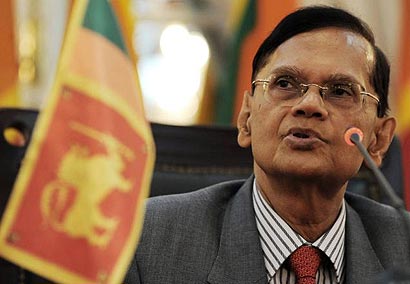UN principles violated: Panel report only for Ban’s info – External Affairs Minister

The government believes that the attempted publication of the panel report on Sri Lanka, which was authorized by the United Nations Secretary General, for the purpose of gathering “insights for his own views,” “is basically wrong and contrary to the principles underpinning the United Nations Charter.”
“The panel has clearly acted in ways beyond its mandate by refusing to confine itself to offering advice to the United Nations Secretary General and assuming for itself, a function which involves adjudication of a kind, suggestive of a quasi-judicial role.
“This was never contemplated as a part of its mandate,” External Affairs Minister Prof G L Peiris told this newspaper in an exclusive interview.
He expressed his surprise and that of the government on conclusions made in the panel report released April 12.
“It is in need astonishing that the panel thought that it was deemed fit and proper to reach conclusions on a wide range of matters currently being examined by the Lessons Learnt and Reconciliation Commission (LLRC) appointed under the provisions of Sri Lankan Statute law,” Prof Peiris told the Daily News yesterday. Earlier, Media Minister Keheliya Rambukwella said that the government would tread with extreme caution and gradually map out a strategy, both locally and internationally, to counter the allegations in the panel report.
He said the report has ingredients of the LTTE rump and those of the Tamil diaspora.
“The appointment of the LLRC was universally acclaimed,” the External Affairs Minister said.
“Foreign governments expressed confidence in the Commission and conferred their good wishes and felicitations on the Commission’s good work. The Commission had held its sittings in not only Colombo, but in the Northern and the Eastern Provinces and has already submitted a series of interim recommendations of the LLRC,” he said.
This committee is headed by the Attorney General and comprises secretaries to seven ministries which are actively involved in the implementation of the recommendations.
“In these circumstances, it is quite bizarre that the panel should take upon itself to treat the Sri Lankan statutory body as though it did not exist, to dismiss it in the most cavalier fashion imaginable and to formulate its own recommendations while the LLRC is continuing its work, Prof Peiris noted.
“Representatives of western governments have had no difficulty in accepting the position of the Sri Lankan government that they should await the publication of the report of the Sri Lankan Commission and assess it objectively and dispassionately.
Prof Peiris said that when he recently visited a western capital, the representatives of the government in question, clearly articulated this position and that no prejudgment was permissible.
However, the minister said, that the attitude of the panel has been the opposite. There has been absolutely no justification for the insensitivity and arrogance with which the Sri Lankan commission has been ignored, he remarked.
Commenting on the reaction of the panel on Sri Lanka vis-a-vis a probable backdrop of similar situations that could arise in other parts of the world, he said: “What is sought to be done in respect of Sri Lanka, on this occasion will have to be done in future in other situations as well.
Sri Lanka cannot be singled out for discriminatory treatment because this would tantamount to cynical violation of the doctrine of sovereign quality of states which is one of the core values embedded in the United Nations Charter”.
”If this is allowed to happen, it would have distressing implications for the United Nations as well,” he added.
Courtesy: Daily News
Latest Headlines in Sri Lanka
- General Amnesty announced for Tri-Forces AWOL personnel, excludes Commissioned Officers April 20, 2024
- Sri Lanka and United States discuss Economic Support and Reforms April 19, 2024
- Israeli missile strikes Iran amid escalating Middle East tensions April 19, 2024
- President says he will build a Sri Lanka that the youth aspire to April 19, 2024
- NPP presents 7-point pledge on Easter Sunday Attack to Cardinal Ranjith April 18, 2024



Reconciliation Commission appointed by Sri Lankangouvernment is an eyewashing commission to cheat once again UN and donors countries specially India.
Afterall you got 500 CRORE rupees from India for reconicliation with tamils where is the result. You lavishly spent for your successive army victories celebration.
You can’t cheat anymore.
If you can talk about the value of reconciliation with tamils how can you settle down all your arm forces with their families in Tamil areas? who authorised you to bring all your soldiers to live in these areas??
Act quickly to remove your all illegal arm forces and sinhalese immigration from north and notheast areas as a postiive reply to UN and donnors countries.
Enough is enough. The next gouvernment in India will not be there anymore to help your dictator Mahinda Babu.
Release immediately Fonseka the man who told the truth to outside world.
srilankan government is correct
Gophi,
Keep dreaming.
Sarath Fonseka’s men are the ones in North. They are the legitimate Army of Sri Lanka. SL government does not need your authorisation to send their army to anywhere in their country.
UN commission was the eye wash commission just to satisfy tamil madmen and their ass licking human rights puppets.
Dear Manjula,
You apparently have an obsessionist relationship with the human posterior observed by the repeated reference to application of the tongue to that part of the body in your blogs.
A Freudian psychoanalysis may assist you in ridding this obsession which isn’t contributing to the otherwise excellence of your journalstic (or communications) capability.